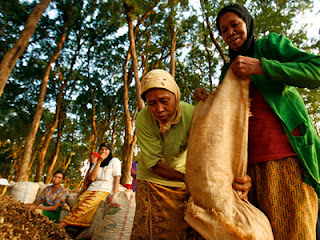Women and Forests
International Day of Forests
Swathi Chaganty
And she is one of the many who
have worked tirelessly in the field of forest conservation, environment
protection and biodiversity preservation. From Margret Murie and Celia Hunter
who shouldered the responsibility of safeguarding the Arctic National Wildlife
Refuge to Rachel Carson – an author, whose passion for environment and acute
observation of conventional farming and its impacts on the environment and
public health led to the development of the Environment Protection Agency (EPA)
in the US to Jane Goodall the world renowned anthropologist and primatologist who
made conservation and animal welfare her life’s mission to Vandana Shiva – who
began her life in environmental activism and studies by documenting the progress of the Chipko Movement in real
time in the late 1980s.
And the achievements of these
women trailblazers did not just fulfil the singular goal of forest conservation
and biodiversity preservation but it did something more than that. Through each
of their journeys, they encouraged hundreds and thousands of women to join
their efforts and brought to the forefront the dynamic of “women and forests”.
Indigenous and rural women living
in forests in many parts of the world are tasked with feeding and taking care
of the family and that includes foraging for medicinal herbs, gathering food
and fuel wood, collecting water. Thus, they are equal stakeholders in the
forest ecosystem, interacting with every aspect of forest life, the wilderness,
the illegal felling, the legal but destructive mining, good and bad conservation
management and practices as well as the complicated land rights issues.
Therefore, understanding their challenges,
viewing forest conservation and management and biodiversity protection from
their perspective will not only give a new impetus to this endeavour but also
make this journey a lot more holistic and sustainable. While the governments
and think tanks engage with this head on, we as responsible citizens of the
world have but one job, to be informed and educated.
Therefore, this International
Forest Day, we have found three comprehensive resources that focus on the
involvement of women in forest conservation.
World Rainforest Movement: An
international initiative that focuses on the challenges faced by and solutions
developed by the indigenous and peasant communities from the Global South. Their
compendium – Women, forests and plantations. The Gender Dimension – published
in 2005 presents several cases studies and articles focusing on the challenges
of mining, illegal felling and climate change.
 |
| Picture Source: World Rainforest Movement |
Forests and Gender: Another
brilliant compilation by Women’s Environment and Development Organization
(WEDO) – an advocacy that focuses on women’s rights, social, economic and
environmental justice — that has compiled case studies from several countries
across the world focused on the relationship between gender and forest
conservation and issues such as climate change. This 123-page quick read,
published in collaboration with International Union for Conservation of Nature
(IUCN) also has a dedicated section aimed at possible strategies and management
processes that can be adopted to gain a gender perspective in nature
conservation management and climate change action plans.
 |
| Picture Source: Forests & Gender by WEDO and IUCN |
Women’s Earth &Climate Action
Network, International (WECAN): A solution-based organization that collaborates
with women worldwide in policy advocacy, grassroots projects, trainings and
building a climate justice movement. One of their major projects Women forForests aids indigenous women in their efforts to stand up to the extractive
industries such as mining, felling, and expansive industrial agriculture that
are threatening the very ecosystems they live in. Their Women Speak initiative
is an international collaboration of collecting stories and cases studies of
women who are at the frontlines of climate change.
 |
| Picture Source: wecaninternational.org |
So, let us keep ourselves
educated and informed, learn to critically view our existing systems through
different lenses, and while we do that put into practice simple actions at an
individual level because as Wangari Maathai said, you do not need a diploma to
plant a tree.
No comments:
Post a Comment